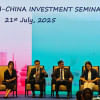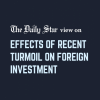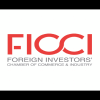Private and foreign investment critical for 2041 goals: Ficci

Bangladesh's development journey has been significantly propelled by trade and surge in private investment.
The country aims to become a developed economy by 2041 and, in that pursuit, elevating living standards and strengthening private and foreign direct investment (FDI) and tax revenue collection will be critical, said the Foreign Investors' Chamber of Commerce & Industry (Ficci) in a publication unveiled yesterday.
"However, several factors hinder FDI in Bangladesh, collectively diminishing its appeal as an investment destination," it said, citing trade, logistics, infrastructure, investment policy, business regulations and a lack of depth in the financial sector and tax environment.
Titled "Catalyzing Greater FDI for Vision 2041: Priorities for Building A Conducive Tax System in Bangladesh", the apex trade body of foreign investors in Bangladesh launched the book at the opening of the two-day "Investment Expo-2023" at the Radisson Blu Dhaka Water Garden to celebrate 60 years of its journey. Prime Minister Sheikh Hasina inaugurated the event.
Ficci said taxation policies, including corporate income tax rates and incentives, significantly influence foreign investors' decisions.
"Studies consistently show that lower corporate tax rates correlate with higher FDI. High tax rates reduce investment returns and deter FDI inflows," the publication read, adding that FDI tends to fall by 3.7 percent following a one percentage point increase in the tax rate.
Ficci said the investment climate in Bangladesh faces several tax-related challenges.
"Bangladesh's tax policy, while designed to support economic development, exhibits issues that can affect its alignment with FDI goals," said Ficci.
The trade body said Bangladesh's tax system has major gaps when compared to international tax principles. It cited neutrality, effectiveness, fairness, efficiency, flexibility as well as certainty and simplicity.
Ficci said unconducive policies, unclear processes and complicated and contradictory regulations, alongside tax disputes and legal hassles, lack of predictability and effectiveness of tax incentives, and hurdles in claiming tax benefits are major challenges.
Also, lack of digitisation, lack of double taxation avoidance agreements with countries, and high total tax incidence are other major challenges, it added.
Ficci said both tax rates and FDI would likely to increase if the tax environment was more conducive.
It said FDI can reach $6.6 billion by 2025, $20 billion by 2031 and $50 billion by 2041 with effective and prudent taxation reforms.
Tax revenue can rise to $227 billion by 2041 if tax reforms are implemented compared to $98 billion without reforms, according to the publication.
The trade body, which represents more than 200 foreign investors in Bangladesh, said private investment, including FDI, has a pivotal role to play in helping Bangladesh achieve its target of upper middle-income status.
"FDI across sectors drives economic growth, job creation, higher incomes and improved living standards," said the trade body.
It said FDI in Bangladesh helped the growth of important industries and infrastructure while facilitating technology diffusion.
Readymade garments, telecommunication, energy, consumer goods, and ICT sector have largely benefited from an influx of FDI, said Ficci.
Ficci said as per the targets set by "Vision 2041", Bangladesh's Gross Domestic Product (GDP), which is now over $450 billion, should increase to $2,333 billion by 2041.
Government spending on public healthcare needs to be two percent of the GDP while spending on education should be four percent of the GDP.
To attain the goal, the nation will need to ensure private investment at over one-third of the GDP. Also, the FDI needs to be $69.99 billion while the government's total revenue needs to be $563 billion, or nearly one-fourth of the country's economy in 2041.
Bangladesh's FDI inflow and Global Value Chain (GVC) integration is lower than potential comparators, it said.
In the wake of global economic shifts, investment policies are gaining greater importance as determination of successes for FDI attraction and retention, said Ficci.
The trade body said various developing countries, including Saudi Arabia, have offered tax incentives for investment. It said Vietnam and India had created a conducive tax framework to bolster their competitive edge in the global investment landscape.
As such, it outlined 29 recommendations to enhance the broader investment climate and bolster overall investors' confidence in areas of business regulations, access to land, infrastructure and logistics, skills and productivity, commercial dispute resolution, trade facilitation, technology diffusion, and access to finance.
Ficci suggested that government agencies implement the suggestions over the short, medium and long-term.
At the inauguration, Ficci President Naser Ezaz Bijoy said the size of Bangladesh's economy was $8 billion at the time of the country's liberation in 1971. Bangladesh is now almost a $500 billion economy and expected to reach $1 trillion 2031.

 For all latest news, follow The Daily Star's Google News channel.
For all latest news, follow The Daily Star's Google News channel. 








Comments